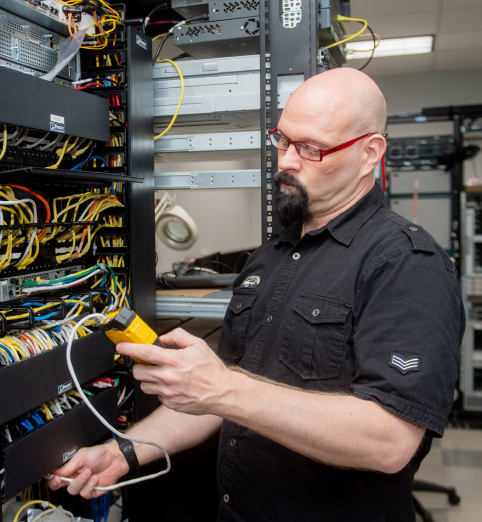The sad reality is that an estimated 71% percent of IT projects fail. (Sorry, that’s just facts.)

No matter if you’re setting up a data center, transitioning your workforce to being 100% remote, or implementing a new approach to security measures—you’ll be juggling numerous individual projects that all must see success in order to reach your ultimate goal. The problem is that IT teams can often focus so intently on executing individual projects to perfection that they don’t devote enough time and energy on the bigger picture and how all those smaller efforts fit together.
Enter: The Technical Program Manager.
Although there is no single silver-bullet that ensures IT project success (wouldn’t that be nice?), a Technical Program Manager can help IT teams navigate the numerous people, process, and communication challenges that inevitably arise when multiple projects and teams are running simultaneously. Program managers are responsible for leading large-scale strategy by coordinating work and managing complexity across projects, so that your IT teams—and company—can tackle those big, hairy initiatives.
Why You Need a Technical Program Manager
A quick search for “technical program manager” or “IT program manager” roles on job sites will bring up a dizzying number of descriptions, definitions, and requirements. No two technical program managers look or function the exact same way. However, there are some common superpowers they all share—and reasons why you want them on your IT team.
1. They maintain a holistic view of multiple projects.
Technical program managers operate differently from project managers because they are responsible for multiple projects that must work together in seamless coordination in order to achieve a goal. If one project fails or puts another project at risk, the entire initiative can suffer (or fail).
Program managers must understand how different projects and initiatives within a team and across teams fit together—like pieces in a giant jigsaw puzzle. This means working alongside members of other technical teams, as well as non-technical disciplines like legal, marketing, finance, or customer support. A program manager’s ability to keep this high-level, comprehensive perspective, rather than drilling deep into individual projects is key to uncovering cross-functional dependencies and ensuring nothing falls through the cracks.
2. They keep things on track and guard against risk at the organization-level.
Given their high-level vantage point and broad view, technical program managers are positioned to keep the best interest of the entire organization in mind—not just a single project or team.
Technical program managers are involved in every aspect of an initiative—from inception through completion and, in many cases, ongoing maintenance. Although they aren’t the ones tackling the work itself or managing individual projects and workstreams, they’re keeping a close eye on the scope, timelines, progress, success metrics, risks, and benefits of every project within their program. In doing so, technical program managers can make judgement calls and decisions about individual projects that collectively impact the entire organization—which is vital when projects compete for the same limited pool of staffing and resources.
3. They facilitate communication and collaboration up, down, and across.
A significant part of the Technical Program Manager role is communication and alignment—not only within their team, but across the organization. They work daily with leadership, stakeholders, and members of other teams to clarify goals, expectations, deadlines, roadblocks, deliverables, and dependencies. This requires a great deal of relationship-management and diplomacy—particularly when it comes to negotiating tradeoffs, advocating for resources, cultivating buy-in, and pushing back against unrealistic expectations.
4. They protect IT talent time.
Technical program managers are IT champions and often serve as intermediaries between more technical disciplines, like engineering and other parts of the organization.
The ideal technical program manager typically has an engineering or development background and brings deep, first-hand technical expertise to the role. They aren’t just experts in processes and project management methodologies and frameworks (though that’s necessary, too). Their domain knowledge allows them to anticipate IT needs, answer technical questions about a project, and accurately identify IT dependencies or roadblocks. Essentially, they’re positioned to advocate for IT, without having to pull other team members away from their work and into endless meetings. They’re also able to translate technical complexity in a way that is easy for others to understand and factor into their decision-making.
At Inteleca, we fight against the IT-project-failure odds by managing major IT project to completion.. Whether you’re a scrappy team of three at a startup or a robust department at a multinational corporation, we can craft custom solutions that see your IT projects through from initial planning to implementation and beyond. Contact us today to learn more.



